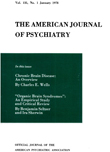AKATHISIA: THE SYNDROME OF MOTOR RESTLESSNESS
Abstract
1. The syndrome of akathisia has been defined and described. It appears to be a manifestation of the Parkinson syndrome.
2. Two cases of akathisia are reported. They both occurred during administration of phenothiazine tranquilizing drugs, and were relieved by changing or stopping the drug and by adding an anti-Parkinson drug. No attempt was made to determine the necessity for adding the anti-Parkinson drug when the tranquilizer was changed, though Kruse(4) reports that "these reactions . . . were always controllable" by anti-Parkinson drugs alone.
3. Akathisia is a syndrome which occurs during the administration of high doses of tranquilizing drugs. Whenever a patient fails to respond to the administration of high doses of these medicines or when he seems to have a paradoxical effect from them, the possibility of akathisia should be considered and appropriate treatment instituted.
4. Appropriate treatment of the condition appears to be, at this time, a reduction or change in the tranquilizing drugs used, plus the addition of an anti-Parkinson drug such as Cogentin, Pagitane, or Kemadrin.
Access content
To read the fulltext, please use one of the options below to sign in or purchase access.- Personal login
- Institutional Login
- Sign in via OpenAthens
- Register for access
-
Please login/register if you wish to pair your device and check access availability.
Not a subscriber?
PsychiatryOnline subscription options offer access to the DSM-5 library, books, journals, CME, and patient resources. This all-in-one virtual library provides psychiatrists and mental health professionals with key resources for diagnosis, treatment, research, and professional development.
Need more help? PsychiatryOnline Customer Service may be reached by emailing [email protected] or by calling 800-368-5777 (in the U.S.) or 703-907-7322 (outside the U.S.).



